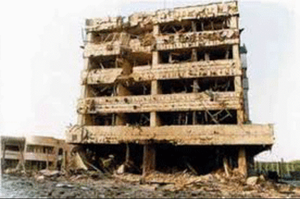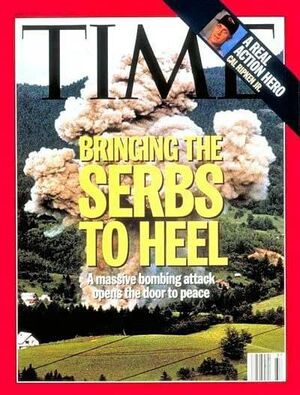Kosovo War
 The Chinese embassy in Belgrade after NATO bombed it | |
| Date | 28 February 1998 - 11 June 1999 |
|---|---|
| Location | Yugoslavia |
| Interest of | "The New Humanitarians", Philip Crawley, Noel Malcolm, Ruder Finn, Jamie Shea |
| Description | An armed conflict in Kosovo |
The Kosovo War was an armed conflict in Kosovo that started 28 February 1998[1] and lasted until 11 June 1999.[2] It was fought by the forces of the Federal Republic of Yugoslavia (i.e. Serbia and Montenegro), which controlled Kosovo before the war, and the Kosovo Albanian rebel group known as the Kosovo Liberation Army (KLA). The conflict ended when the North Atlantic Treaty Organization (NATO) intervened by beginning air strikes in March 1999 which resulted in Yugoslav forces withdrawing from Kosovo.
Contents
Propaganda
The war and the lead-up to it was characterized by several war propaganda stories.
- The "Kosovo student poisoning" in 1990.
- Operation Horseshoe - a fake plan of alleged Serbian ethnic cleansing.
- The Račak massacre that never was.
- The propaganda term collateral damage was popularized by NATO spokesperson Jamie Shea.
- The mass exodus of Albanians when the war started was a psy-op to create international support for the NATO bombing campaign. The exodus was arranged by local clan leaders.[3]
The Big Lie
A letter dated 15 April 1999 from Downing Street press secretary Alastair Campbell to Tony Blair's chief of staff Jonathan Powell, made clear that British planners considered "control and coordination" of NATO's media campaign as vital. Campbell stated this was "because the propaganda battle is not just won by fact, but by message, and the means by which the message is deployed" In relation to Allied Force, he added that "the message is simple. This is a just cause. We are going to win".[4]
Campbell also proclaimed:
The key to message delivery is the creation of those events and stories. This requires making the most of what the military are doing...Every big campaign requires a press article factory. Not a day should pass without us having authored or heavily influenced, comment/editorial pieces in every major country".[5]
Other things
- The Balkan Action Committee was a spooky ad-hoc group set up drive the operation forward.
- Many of the international observers, from DynCorp and OSCE[6] in the province before the war were CIA operatives marking bombing targets.
- The NATO bombing used depleted uranium both in Kosovo and Serbia proper, polluting the bombing sites with radioactivity for centuries.
- The bombing of the Chinese embassy in Belgrade, first explained as a mistake, turned out to be a deliberate act.
- The Kosovo mafia was allowed to run a large scale heroin smuggling network and other criminal rackets in Western Europe at least since the 1980s, to finance the armed independence movement (KLA).
- The operation was also financed by organized organ harvesting.[7]
- The 1999 Orderud killings in Norway might have a connection to the NATO intelligence support for KLA and the regime change effort in Yugoslavia.
- International jihadist mercenary networks were used, establishing bases in Albania
- NATO intelligence services had extensive cooperation with international Islamist networks of holy warriors.
- The war led to the building of Camp Bondsteel a major US base.
- The Pristina airport standoff between Russian and NATO troops was one of the first operations Vladimir Putin directed.
- Kosovo's unilateral declaration of independence from Serbia, recognized by all NATO countries as an "exceptional case", changed international law. Russia soon started recognizing breakaway republics in Georgia and later in other places.
Hacking bank accounts in third countries
In May 1999, President Bill Clinton issued a "finding," where the CIA was instructed to conduct a cyberwar against Yugoslavia, using government hackers to tap into foreign banks and, in the words of one U.S. official, "diddle with Milosevic's bank accounts". Under the authorization, the US allies were to be kept in the dark about the plan. The banks were located in third countries, including Russia, Greece and Cyprus. If they gained access to the accounts, the hackers could do almost anything they liked with the cash -steal it, move it to a dummy account or slowly drain it away a few thousand dollars at a time.[8]
The authorization was immediately criticized by some US lawmakers who questioned the wisdom of launching a risky covert action that, if discovered, would undermine confidence in the world banking system; in that case the United States would be the main loser.[8]
Related Quotation
| Page | Quote | Author | Date |
|---|---|---|---|
| Jamie Shea | “The fact that 70% of the country's territory is left without electricity shows that we are keeping our finger on the switch. We can turn the electricity on and off where we need it and where we want it.” | Jamie Shea | 4 May 1999 |
Related Documents
| Title | Type | Publication date | Author(s) | Description |
|---|---|---|---|---|
| Document:Inhuman treatment of people and illicit trafficking in human organs in Kosovo | webpage | 7 January 2011 | Dick Marty | |
| Document:International Injustice: the Conviction of Radovan Karadzic | article | 30 March 2016 | Diana Johnstone | Commentary on the guilty verdict on Radovan Karadzic by the International Criminal Court on 24 March 2016 |
| Document:Kosovo Mafia | article | Matt McAllester Jovo Martinovic | ||
| Document:The Balkan Wars | book review | 21 February 2003 | Edward Herman | |
| File:UNMIK Investigation Organ Trafficking Kosovo.pdf | report | Extensive information about human organ trafficking in Kosovo implicating senior members of the Kosovo government. It comprises a memo to the then UN Chief of Investigations from the Head of the UNMIK Mission - the UN Interim Administration Mission in Kosovo - dated 30 October 2003, together with documents dealing with various aspects of the investigations. |
References
- ↑ http://reliefweb.int/sites/reliefweb.int/files/resources/6D26FF88119644CFC1256989005CD392-thekosovoreport.pdf
- ↑ https://books.google.com/books?id=PC4_AwAAQBAJ&pg=PA175
- ↑ https://off-guardian.org/2017/02/21/why-albanians-fled-kosovo-during-the-1999-nato-bombing/
- ↑ https://www.declassifieduk.org/britains-covert-propaganda-campaign-over-kosovo/
- ↑ https://discovery.nationalarchives.gov.uk/details/r/C17710423
- ↑ http://www.slobodan-milosevic.org/kla-cia.htm
- ↑ see File:UNMIK Investigation Organ Trafficking Kosovo.pdf and Document:Inhuman treatment of people and illicit trafficking in human organs in Kosovo
- ↑ a b https://www.newsweek.com/cyberwar-and-sabotage-166628
